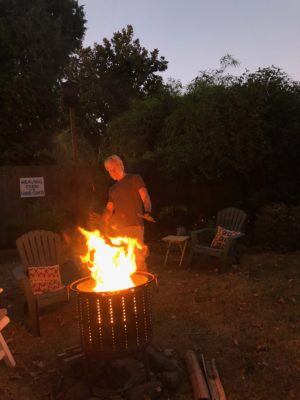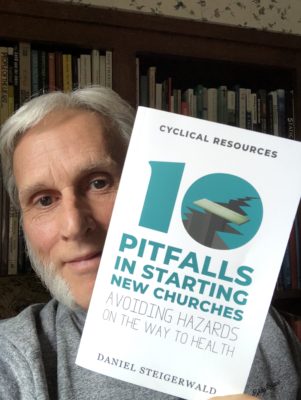Attending to the Deep Questions at Each Stage of Life

“I suspect that there are different questions for every age in life, perhaps every decade. Knowing them helps us to deal with people sensitively, and it gives us a better understanding of how to build a larger view of our own lives. . . And here’s the kicker. As the questions change, so does the content (and perhaps the form) of our spiritual interests. The `questions’ often become our way of approach when we go to the Scriptures looking for spiritual sustenance. They become a guide when we buy books. The questions form our approach to spiritual life. So if the way one does spiritual life was formed around twenty-something questions and one is now fifty, spiritual life will likely be obsolete and ineffective.
In each decade of life as the questions change, the Bible reader discerns new insights from the familiar Bible stories or teachings. The themes of prayer also change. The dangers and temptations inherent in the spiritual journey are modified. And in each decade of life, new decisions leading to deepening commitment present themselves. So, knowing the appropriate questions that we are likely to face at the end of the track in each decade of life just might help us become big-picture thinkers.”
– A Resilient Life, Gordon MacDonald (Nashville: Thomas Nelson, 2004), 50,51.
It’s been some time since Gordon MacDonald wrote this book. And yet, I think there’s still much truth in his assertion that every decade of adulthood tends to have its own unique deep life questions. A basic tenet of “appreciative inquiry” is that people actually tend to move in the direction of their questions. If that’s true, it seems wise to have a running bead on what may be simmering below the surface in the life of anyone we’re walking alongside. Some of those questions may be vivid, some imperceptible, and yet they emit an energy in the soul that seeks resolution – and that’s usually not met by simple answers. Because of the power such questions can exude in our journeys, I offer a summary of MacDonald’s decadal questions, except I have slightly reworded and re-cast his “Resilient Life” version. Where he framed the questions in a closed manner, I turned them into open-ended questions. And where I noticed some minor gaps, based on my own observations in coaching/mentoring folks across a broad range of age-diversity these past 30 years, I slightly massaged MacDonald’s decadal descriptions and added an additional question here and there.
————
20’s – The game of life is no longer an amateur game of the teen years, it is now viewed as a more serious matter with increasingly serious consequences, and one must identify an organizing principle that will bring the pieces of life into order. Fear of rejection, loneliness and the feeling that one might not fit in are common deep-seated concerns. The kind of questions relate to one’s differentiating of self, bolstering a sense of identity and cultivating the connections needed for growth in adulthood.
• What kind of man or woman am I becoming?
• How am I different than my mother or father?
• When can I find a few friends who will welcome me as I am and who will offer the family-like connections that I need (or never had)?
• Can I love, and am I lovable?
• What am I going to do with my life to make a difference, and with whom will I partner?
• What is it that I really want in exchange for my life’s labor?
• Around what person or conviction will I organize my life?
————
30’s – The longer-range responsibilities of life begin to accumulate, and one’s sense of personal freedom is compromised as more permanent relationships and commitments are made. The expansion of responsibility (to spouses, children, employers) with little or no expansion of time in their schedules. “Empty,” “tired,” “confused” or “drifting” are not uncommon words that drift through their minds. Within the harried lifestyle of the 30’s, blanket shame or guilt from a sense of not being able to do enough, be enough, make enough, etc. tends to assert itself.
• How far can I go in fulfilling my sense of purpose?
• Who are the people I know well and that can walk through life with me?
• What does my spiritual life look like, and where can I find the time to grow in this way?
• Why am I not a better person, nor the person I’d imagined I’d be by now?
• Where are peace and a sense of sabbath to be found amid the demands of life?
• What do I do with this nagging sense that I don’t quite measure up?
————-
40’s – The complexities of life accelerate even more, and one can no longer apply “young” solutions nor can she ignore the flaws and hindering issues that she once could put on the shelf. A “grown up” way of operating is expected of her. The idealism of youth is chastened or replaced by a colder realism, which may lead to a mid-life dabbing once again in former youthful pursuits (i.e. “maybe in going back I’ll re-ignite something I seem to have lost”). Feelings of being “trapped” are not uncommon, and the hunger for a long sabbatical to re-orienteer life direction often runs deep.
• Who was I as a child, and what powers back then still influence the person I am today?
• How do I prioritize the demands being made on my life? Where do I need to start saying “no” more resolutely?
• Why are some people seemingly better off than me; how do I come to grips with that?
• What’s at the root of me often feeling disappointed in myself and in others?
• Where limitations are beginning to outweigh my options, what else might I do to re-open my life?
• With all uncertainties I face, to who can I turn and is God still trustworthy?
• What can I do to make a greater contribution to my generation?
• How could I pursue a new calling in life and do the thing I’ve always wanted to do?
————-
50’s – The first strong inklings of one’s mortality come to the fore, as one begins to wonder how many years of productive life are left. As I move into the second half of life, who is this younger generation that wants me out of the way and how do I cope with the disappointments in my life? This is a time for sober reflection. The days for fantasizing great achievements are gone. My ambitions and goals must be realistic, or I’m going to face a lot of disappointment ahead.
• How will I cope practically as my body becomes less reliable?• How can I deal with my disappointments, failures and successes in life?
• Who are these young people who want to replace me, and what’s ahead for me as I step back more and more vocationally?
• How can I and my spouse/partner re-invigorate our relationship, now that our children have flown the nest?
• Why is time moving so fast, and what do I do with my doubts and fears?
• What if we don’t have enough finances to navigate the expenses of growing older, having less income potential, and greater health limitations?
———-
60’s – What is yet to be accomplished in this life becomes dominant, including the invitation to moor one’s value in intrinsic factors and not simply in one’s success, achievements, position, wealth, social circle, etc. In the space of quiet reflection, many new doubts and fears may emerge about the future.
• How will I have enough time and health to do the things I’ve always wanted to do?
• What can I do with the feeling of being ignored or undervalued by younger people?
• Who will be around me when I die, and how will what I’ve done outlive me?
• How will I navigate the many losses coming my way, including losing people I love?
• What beliefs in my life need to be challenged/updated to carry me to the end?
• What has always been true for me, and how is that showing up now?
• Where are joy and peace to be found beyond the productive years?
———-
70’s – 80’s – Life has many afterglow moments to discover, and there’s often room to explore what’s been satisfying over my lifetime, where there’s remorse or regret, and with whom do I need to make amends.
• How do I live with loss, and what does it mean to grieve well?
• How much of my life can I still control, and what might I still contribute?
• How might I end well with a grateful, peaceful heart not dominated the cynicism, anger and complaining that too often comes with becoming “old”?
• Who remembers who I once was, and how do I rest in the assurance that God sees me?
• If my story doesn’t seem that important to anyone, how can I re-ground myself and find fresh consolation in God?
• How can I ready myself to face death and whatever is coming in the afterlife?


